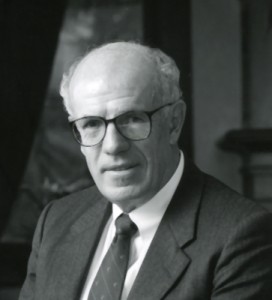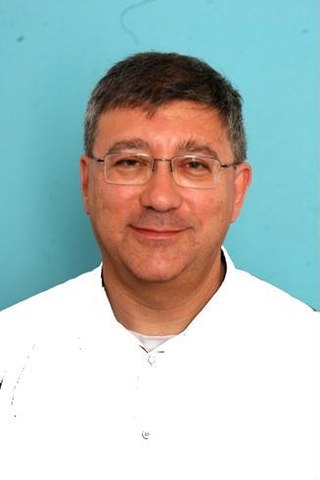
Renato Marcos Endrizzi Sabbatini is a retired professor at the Department of Biomedical Engineering and at the State University of Campinas Institute of Biology. He received a B.Sc. in Biomedical Sciences from Medical School of the University of São Paulo and a doctorate in behavioral neuroscience in 1977, followed by postdoctoral work at the Max Planck Institute of Psychiatry's Primate Behavior Department. He founded the Center for Biomedical Informatics, and helped create the Brazilian Society for Health Informatics.
The International Medical Informatics Association (IMIA) is an independent organization that plays a role in promoting and furthering the application of information science in modern society, particularly in the fields of healthcare, bioscience and medicine. It was established in 1967 as a technical committee of the International Federation for Information Processing (IFIP). It became an independent organization in 1987 and was established under Swiss law in 1989.

Solomon Halbert Snyder is an American neuroscientist who has made wide-ranging contributions to neuropharmacology and neurochemistry. He studied at Georgetown University, and has conducted the majority of his research at the Johns Hopkins School of Medicine. Many advances in molecular neuroscience have stemmed from Snyder's identification of receptors for neurotransmitters and drugs, and elucidation of the actions of psychotropic agents. He received the Albert Lasker Award for Basic Medical Research in 1978 for his research on the opioid receptor, and is one of the most highly cited researchers in the biological and biomedical sciences, with the highest h-index in those fields for the years 1983–2002, and then from 2007 to 2019.
Edward ("Ted") Hance Shortliffe is a Canadian-born American biomedical informatician, physician, and computer scientist. Shortliffe is a pioneer in the use of artificial intelligence in medicine. He was the principal developer of the clinical expert system MYCIN, one of the first rule-based artificial intelligence expert systems, which obtained clinical data interactively from a physician user and was used to diagnose and recommend treatment for severe infections. While never used in practice, its performance was shown to be comparable to and sometimes more accurate than that of Stanford infectious disease faculty. This spurred the development of a wide range of activity in the development of rule-based expert systems, knowledge representation, belief nets and other areas, and its design greatly influenced the subsequent development of computing in medicine.
Vimla Lodhia Patel is a Fijian-born Canadian cognitive psychologist and biomedical informaticist.
The American Association for Medical Systems and Informatics (AAMSI) was an organization created to encourage improvements in the state of medical care by encouraging the development of computer systems for that field.

Homer Richards Warner was an American cardiologist who was an early proponent of medical informatics who pioneered many aspects of computer applications to medicine. Author of the book, Computer-Assisted Medical Decision-Making, published in 1979, he served as CIO for the University of Utah Health Sciences Center, as president of the American College of Medical Informatics, and was actively involved with the National Institutes of Health. He was first chair of the Department of Medical Informatics at the University of Utah School of Medicine, the first American medical program to formally offer a degree in medical informatics.
The American Medical Informatics Association (AMIA), is an American non-profit organization dedicated to the development and application of biomedical and health informatics in the support of patient care, teaching, research, and health care administration.
Don E. Detmer is professor emeritus and professor of medical education at the University of Virginia.

Jesse Menachem Ehrenfeld is an American physician. Ehrenfeld is President of the American Medical Association and Professor of Anesthesiology at the Medical College of Wisconsin. He is also a former Speaker of the Massachusetts Medical Society, where he was the youngest officer in the 228-year history of the organization. He is also a former Vice-President of the Massachusetts Society of Anesthesiologists. The inaugural recipient on the NIH Sexual and Gender Minority Research Award from the NIH Director, Ehrenfeld has been recognized for his contributions to advancing health equity. A 2008 recipient of the AMA Foundation Leadership Award, Ehrenfeld is a researcher in the field of biomedical informatics. Ehrenfeld's research interests include bioinformatics and the application of information technology to increase quality, reliability and patient safety. Ehrenfeld's work has led to the presentation of over 200 abstracts at national/international meetings and the publication of over 175 manuscripts in peer-reviewed journals. He serves as Editor-in-Chief of the Journal of Medical Systems, and is a fellow of the American Medical Informatics Association and the American Society of Anesthesiologists.

Yves A. Lussier is a physician-scientist conducting research in Precision medicine, Translational bioinformatics and Personal Genomics. As a co-founder of Purkinje, he pioneered the commercial use of controlled medical vocabulary organized as directed semantic networks in electronic medical records, as well as Pen computing for clinicians.
Juhn Atsushi Wada was a Japanese–Canadian neurologist known for research into epilepsy and human brain asymmetry, including his description of the Wada test for cerebral hemispheric dominance of language function. The Wada Test remains the gold standard for establishing cerebral dominance and is conducted worldwide prior to epilepsy surgery.

Marc Trevor Tessier-Lavigne is a Canadian-American neuroscientist who is the outgoing 11th president of Stanford University.

Ruth Dayhoff is an American physician and medical bioinformatician.

Yuval Shahar, M.D., Ph.D., is an Israel professor, physician, researcher and computer scientist

Lucila Ohno-Machado is a biomedical engineer and the chair of the Department of Biomedical Informatics and associate dean for informatics and technology at UC San Diego. She is an elected member of the American Society for Clinical Investigation and the National Academy of Medicine.

Betsy L. Humphreys is an American medical librarian. She was the deputy director of the National Library of Medicine from 2005 until her retirement in 2017, serving as Acting Director from 2015 to 2016.
Adriana Galván is an American psychologist and expert on adolescent brain development. She is a professor of psychology at the University of California, Los Angeles (UCLA) where she directs the Developmental Neuroscience laboratory. She was appointed the Jeffrey Wenzel Term Chair in Behavioral Neuroscience and the Dean of Undergraduate Education at UCLA.

Dean Forrest Sittig is an American biomedical informatician specializing in clinical informatics. He is a professor in Biomedical Informatics at the University of Texas Health Science Center at Houston and Executive Director of the Clinical Informatics Research Collaborative (CIRCLE). Sittig was elected as a fellow of the American College of Medical Informatics in 1992, the Healthcare Information and Management Systems Society in 2011, and was a founding member of the International Academy of Health Sciences Informatics in 2017. Since 2004, he has worked with Joan S. Ash, a professor at Oregon Health & Science University to interview several Pioneers in Medical Informatics, including G. Octo Barnett, MD, Morris F. Collen, MD, Donald E. Detmer, MD, Donald A. B. Lindberg, MD, Nina W. Matheson, ML, DSc, Clement J. McDonald, MD, and Homer R. Warner, MD, PhD.

Melissa Anne Haendel is an American bioinformaticist who is the Chief Research Informatics Officer of the Anschutz Medical Campus of the University of Colorado as well as a Professor of Biochemistry and Molecular Genetics and the Marsico Chair in Data Science. She serves as Director of the Center for Data to Health (CD2H). Her research makes use of data to improve the discovery and diagnosis of diseases. During the COVID-19 pandemic, Haendel joined with the National Institutes of Health to launch the National COVID Cohort Collaborative (N3C), which looks to identify the risk factors that can predict severity of disease outcome and help to identify treatments.











